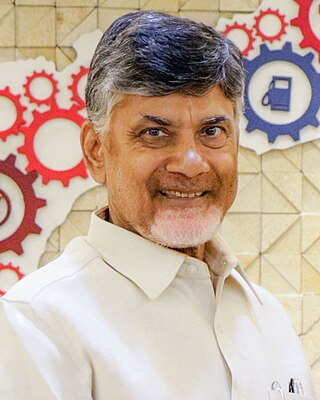
Nara Chandrababu Naidu,also known as Chandrababu Naidu or CBN,is an Indian politician and the current leader of the opposition in the Andhra Pradesh Legislative Assembly. He also served as Chief Minister from 1995 to 2004 and as opposition leader from 2004 to 2014 of Andhra Pradesh. He has been the president of the Telugu Desam Party (TDP) since 1995.

India is a federal republic comprising 28 states and 8 union territories. The states and union territories are further subdivided into districts and smaller administrative divisions.

Shankar Dayal Sharma was an Indian lawyer and politician from the state of Madhya Pradesh who served as the ninth president of India,from 1992 to 1997.

Neelam Sanjiva Reddy was an Indian politician who served as the sixth president of India,serving from 1977 to 1982. Beginning a long political career with the Indian National Congress Party in the independence movement,he went on to hold several key offices in independent India –as Deputy Chief minister of Andhra state and the first chief minister of Andhra Pradesh,a two-time Speaker of the Lok Sabha and a Union Minister—before becoming the Indian president.

The district magistrate,also known as the district collector or deputy commissioner,is a career civil servant who serves as the executive head of a district's administration in India. The specific name depends on the state or union territory. Each of these posts has distinct responsibilities,and an officer can assume all of these roles at once. The district magistrate is primarily responsible for maintaining law and order,while the district collector focuses on revenue administration,and the deputy commissioner is in charge of overseeing developmental activities and coordinates government departments. Additionally,they also serve as election officers,registrar,marriage officer,licensing authority,and managing disaster responses,among other things. While the specific scope of duties may vary from state to state,they are generally similar. The district magistrate comes under the general supervision of divisional commissioner.

Tirunellai Narayana Iyer Seshan was an Indian civil servant and bureaucrat who served with the Indian Administrative Service. After serving in various positions in Madras and in various ministries of the Central Government,he served as the 18th Cabinet Secretary of India in 1989. He was appointed the 10th Chief Election Commissioner of India (1990–96) and became known for his electoral reforms. He won the Ramon Magsaysay Award for government service in 1996.
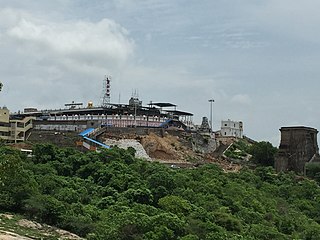
Tiruttani is a town in the Tiruvallur district,a suburb of Chennai within the Chennai Metropolitan Area,located in the state of Tamil Nadu,India. The town is renowned for the Tiruttani Murugan Temple,which is one of the Arupadaiveedu and is dedicated to Kartikeya (Murugan). Tiruttani was added to the Chennai Metropolitan Area in October 2022.
Raja Sri Ravu SvetachalapatiSir Ramakrishna Ranga RaoKCIE was an Indian politician and zamindar who served as the First Minister of Madras Presidency from 5 November 1932 to 4 April 1936 and 24 August 1936 to 1 April 1937.

The recorded history of Andhra Pradesh,one of the 28 states of 21st-century India,begins in the Vedic period. It is mentioned in Sanskrit epics such as the Aitareya Brahmana. Its sixth-century BCE incarnation Assaka lay between the Godavari and Krishna Rivers,one of sixteen mahajanapadas. The Satavahanas succeeded them,built Amaravati,and reached a zenith under Gautamiputra Satakarni.

Mandakolathur Patanjali Sastri was the second Chief Justice of India,serving in the post from 7 November 1951 to 3 January 1954.

Koka Subba Rao was the ninth Chief Justice of India (1966–1967). He also served as the Chief Justice of the Andhra Pradesh High Court.
Patibandla. Chandrasekhara Rao was an Indian jurist. He was from Veerullapadu Village Guntur-Krishna District region of coastal Andhra Pradesh of what was then called Madras Presidency.

The first legislative assembly Election to the Madras state based on universal adult suffrage was held in 27 March 1952. This was the first election held in Madras state after the Indian Independence. This election was officially known as the 1951 Madras State Election,even though through delays,actual voting didn't take place until early 1952.
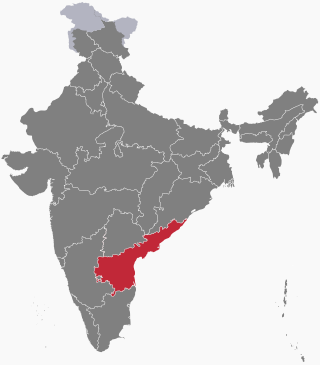
Elections in Andhra Pradesh state,India are conducted in accordance with the Constitution of India. The Assembly of Andhra Pradesh creates laws regarding the conduct of local body elections unilaterally while any changes by the state legislature to the conduct of state level elections need to be approved by the Parliament of India. In addition,the state legislature may be dismissed by the Parliament according to Article 356 of the Indian Constitution and President's rule may be imposed.

Kala Venkata Rao was an Indian independence activist and politician. He served as the Minister for Revenue in the governments of the Madras Presidency and Andhra Pradesh. He also served as the Minister of Finance in the latter.
Ryder Devapriam was systematic theologian who taught during the 1960s and the 1970s at the Andhra Christian Theological College,a Protestant Regional Theologiate in Secunderabad,affiliated to the nation's first University,the Senate of Serampore College (University){a University under Section 2 (f) of the University Grants Commission Act,1956}with degree-granting authority validated by a Danish Charter and ratified by the Government of West Bengal.
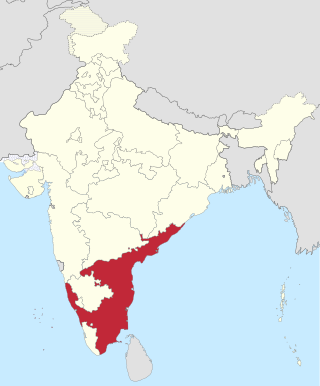
Madras State was a state of India which was in existence during the mid-20th century. The state came into existence on 26 January 1950 when the Constitution of India was adopted and included the present-day Tamil Nadu,Kerala and parts of neighboring states of Andhra Pradesh and Karnataka. Andhra state was separated in 1953 and the state was further re-organized when states were redrawn linguistically in 1956. On 14 January 1969,the state was renamed as Tamil Nadu.

The States Reorganisation Act,1956 was a major reform of the boundaries of India's states and territories,organising them along linguistic lines.
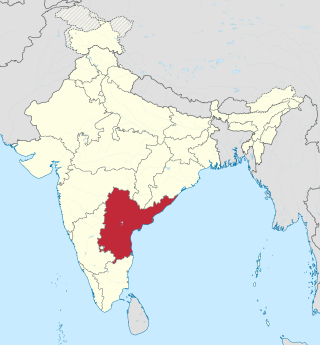
Andhra Pradesh,retrospectively referred to as United Andhra Pradesh,Undivided Andhra Pradesh or Ummadi Andhra Pradesh,was a state in India formed by States Reorganisation Act,1956 with Hyderabad as its capital and was reorganised by Andhra Pradesh Reorganisation Act,2014. The state was made up of three distinct cultural regions of Telangana,Rayalaseema,and Coastal Andhra. Before the 1956 reorganisation,Telangana had been part of Hyderabad State ruled by Nizam of Hyderabad,whereas Rayalaseema and Coastal Andhra had been part of Andhra State,formerly a part of Madras Presidency ruled by British India.















